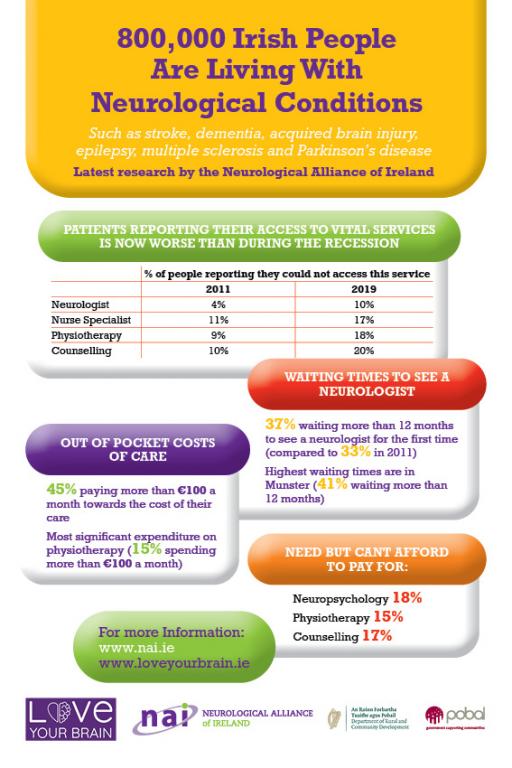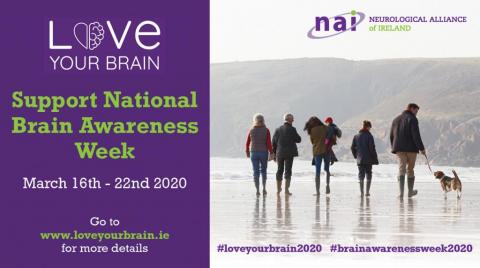In advance of Brain Awareness Week, the Neurological Alliance of Ireland have released findings of the survey they commissioned last year on "Living with a Neurological Condition in Ireland". Many of our members, service users and volunteers will remember that we circulated this survey widely on our website and social media channels at the time the survey was lauched. We have included the full press release from the NAI along with the infograph from the survey below:
-NEW SURVEY FINDS ACCESS TO NEUROLOGICAL SERVICES WORSE THAN DURING THE RECESSION-
-Neurological Alliance of Ireland release findings in advance of Brain Awareness Week-
New research conducted by the Neurological Alliance of Ireland (NAI) has discovered that access to vital services for people with neurological conditions is now worse than during the recession.
The NAI, who are the national umbrella body for neurological charities in Ireland, have released their findings in advance of Brain Awareness Week which takes place March 16th to 22nd.
body for neurological charities in Ireland, have released their findings in advance of Brain Awareness Week which takes place March 16th to 22nd.
Brain Awareness Week aims to promote greater awareness and understanding of the brain and brain disease as well as highlighting the need for more investment in services, research and prevention. Neurological conditions are the leading cause of disability worldwide and the second leading cause of death, with an increase of 36.7% from 1990 to 2015.
Speaking in advance of Brain Awareness Week next week, Executive Director for the Neurological Alliance Magdalen Rogers, revealed the stark findings of a wide ranging survey regarding access to services in Ireland today, commenting "Our periodic survey on Living with a Neurological Condition in Ireland examined access to services for the diagnosis, treatment and rehabilitation of neurological conditions. Between 2011 and 2019 it was found that the percentage of people who reported they could not access vital services had more than doubled, including neurology, nurse specialists, physiotherapy and counselling services.
Waiting times to see a neurologist have also increased-with 37% reporting a waiting time of more than twelve months in 2019 compared to 33% in 2011. Our survey, which was conducted towards the end of 2019, also looked at waiting times by region. It was found that Munster has the most significant proportion of long waits with 41% reporting waiting more than twelve months".
The survey also questioned respondents about the associated costs of healthcare for their condition. Almost half of respondents reported paying more than €100 in associated healthcare costs as a result of having a neurological condition with the most significant area of expenditure on physiotherapy.
The NAI believe that one of the critical reasons for this is the complete lack of progress that has been made in implementing the National Neurorehabilitation Strategy which was published nearly a decade ago in 2011. The strategy committed to providing a nationwide network of hospital and community-based services for people with conditions such as stroke, acquired brain injury, multiple sclerosis and Parkinson's disease.
Alexis Donnelly, a person living with multiple sclerosis and a lecturer in computer science was a patient representative on the working group which developed the Neurorehabilitation Strategy. Alexis says he is devastated at the lack of progress on the strategy, commenting "I feel completely let down but what makes me most angry is the lost opportunities for so many people due to the failure to put services in place. We talk about our country's recovery but where was their chance for recovery?
A further challenge is the significant threat to existing services from successive years of cutbacks to Section 39 disability organisations which are the primary providers of specialist services to people with neurological conditions living in the community. Ms Rogers noted "These organisations stepped in because the State did not develop the neurorehabilitation services taken for granted in other countries. Now we have a serious crisis for people with neurological conditions in this country as even the limited services they have are under threat".
In her concluding comments, Ms Rogers demanded action from any new Government to invest in neurology and neurorehabilitation services including those provided by Section 39 organisations. "We are calling on any new Government to honour commitments made over decades to invest in services for the 800,000 Irish people living with neurological conditions".
ENDS

